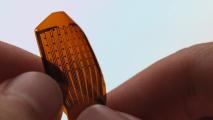In a recent trial, an experimental procedure that uses ultrasound pulses to zap renal nerves was shown to lower patients’ high blood pressure, doing for them what medications alone couldn’t.
“These results suggest that renal denervation has potential to become an important add-on to medication therapy,” Ajay Kirtane, the trial’s co-principal investigator, said in a press release.
The challenge: As blood moves through the circulatory system, it pushes against the walls of the arteries. Blood pressure is a measure of that force, and if it’s too high, the arteries can be damaged, leading to heart attacks or strokes.
Nearly half of all adults in the U.S. have high blood pressure (or “hypertension”), and while many are able to manage the condition with medications, about 20% of people have what’s known as “resistant hypertension,” meaning it doesn’t respond well to even aggressive treatment.
Renal denervation: The arteries leading to the kidneys contain nerves that help regulate blood pressure. These renal nerves tend to be overactive in people with hypertension, so doctors will sometimes prescribe medications designed to decrease their activity.
Renal denervation is an alternative treatment designed to help people who don’t respond to those medications.
During the procedure, a device is inserted into an artery in the patient’s leg via a catheter. It then follows the artery up to their kidneys and uses either radio frequencies or ultrasound waves to disrupt the renal nerves.
The trial: Renal denervation is still an experimental procedure, but the results of a recent Columbia University trial suggest it’s worth pursuing further.
During the trial, 136 people with resistant hypertension, all of whom were prescribed the same three medications, were treated with either ultrasound renal denervation or a sham procedure.
An 8-point drop is almost certainly going to help reduce the risk of heart attack.
Ajay Kirtane
Two months afterward, the treatment group’s blood pressure had fallen by more than twice that of the control group: 8 points versus 3 points.
Looking ahead: The researchers plan to follow up with trial participants for five years to see whether the positive impact of renal denervation is permanent — and potentially life-saving.
“For patients with drug-resistant hypertension, a drop in blood pressure of 8 points — if maintained over longer-term follow-up — is almost certainly going to help reduce the risk of heart attack, stroke, and other adverse cardiac events,” Kirtane said.
We’d love to hear from you! If you have a comment about this article or if you have a tip for a future Freethink story, please email us at tips@freethink.com.






